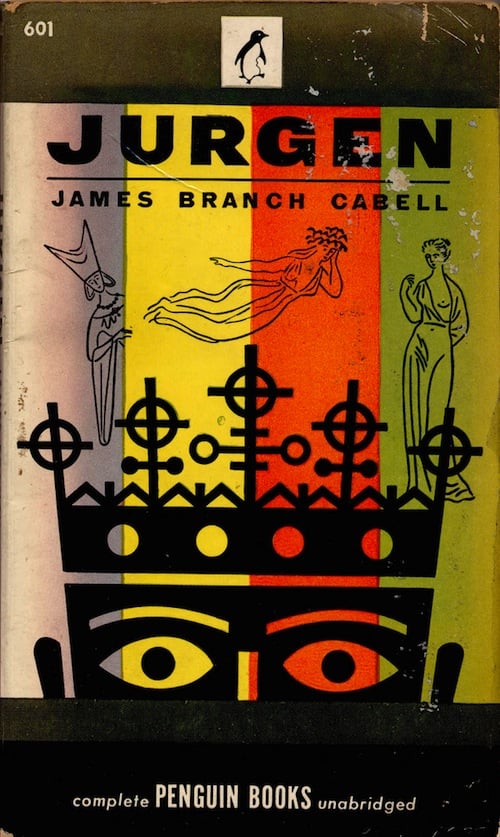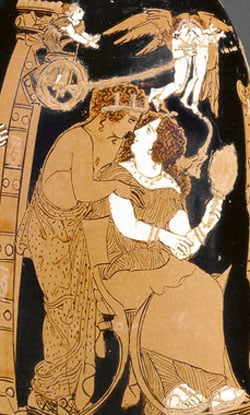Jurgen (48)
By:
February 13, 2016

James Branch Cabell’s 1919 ironic fantasy novel Jurgen, A Comedy of Justice, the protagonist of which seduces women everywhere he travels — including into Arthurian legend and Hell itself — is (according to Aleister Crowley) one of the “epoch-making masterpieces of philosophy.” Cabell’s sardonic inversion of romantic fantasy was postmodernist avant la lettre. HiLoBooks is pleased to serialize Jurgen here at HILOBROW. Enjoy!
And for the third time Koshchei waved his hand. Now came to Jurgen a gold-haired woman, clothed all in white. She was tall, and lovely and tender to regard: and hers was not the red and white comeliness of many ladies that were famed for beauty, but rather it had the even glow of ivory. Her nose was large and high in the bridge, her flexible mouth was not of the smallest; and yet, whatever other persons might have said, to Jurgen this woman’s countenance was in all things perfect. And, beholding her, Jurgen kneeled.
He hid his face in her white robe: and he stayed thus, without speaking, for a long while.
“Lady of my vision,” he said, and his voice broke — “there is that in you which wakes old memories. For now assuredly I believe your father was not Dom Manuel but that ardent bird which nestled very long ago in Leda’s bosom. And now Troy’s sons are all in Adês’ keeping, in the world below; fire has consumed the walls of Troy, and the years have forgotten her tall conquerors; but still you are bringing woe on woe to hapless sufferers.”

And again his voice broke. For the world seemed cheerless, and like a house that none has lived in for a great while.
Queen Helen, the delight of gods and men, replied nothing at all, because there was no need, inasmuch as the man who has once glimpsed her loveliness is beyond saving, and beyond the desire of being saved.
“To-night,” says Jurgen, “as once through the gray art of Phobetor, now through the will of Koshchei, it appears that you stand within arm’s reach. Hah, lady, were that possible — and I know very well it is not possible, whatever my senses may report, — I am not fit to mate with your perfection. At the bottom of my heart, I no longer desire perfection. For we who are tax-payers as well as immortal souls must live by politic evasions and formulae and catchwords that fret away our lives as moths waste a garment; we fall insensibly to common-sense as to a drug; and it dulls and kills whatever in us is rebellious and fine and unreasonable; and so you will find no man of my years with whom living is not a mechanism which gnaws away time unprompted. For within this hour I have become again a creature of use and wont; I am the lackey of prudence and half-measures; and I have put my dreams upon an allowance. Yet even now I love you more than I love books and indolence and flattery and the charitable wine which cheats me into a favorable opinion of myself. What more can an old poet say? For that reason, lady, I pray you begone, because your loveliness is a taunt which I find unendurable.”
But his voice yearned, because this was Queen Helen, the delight of gods and men, who regarded him with grave, kind eyes. She seemed to view, as one appraises the pattern of an unrolled carpet, every action of Jurgen’s life: and she seemed, too, to wonder, without reproach or trouble, how men could be so foolish, and of their own accord become so miry.

“Oh, I have failed my vision!” cries Jurgen. “I have failed, and I know very well that every man must fail: and yet my shame is no less bitter. For I am transmuted by time’s handling! I shudder at the thought of living day-in and day-out with my vision! And so I will have none of you for my wife.”
Then, trembling, Jurgen raised toward his lips the hand of her who was the world’s darling.
“And so farewell to you, Queen Helen! Oh, very long ago I found your beauty mirrored in a wanton’s face! and often in a woman’s face I have found one or another feature wherein she resembled you, and for the sake of it have lied to that woman glibly. And all my verses, as I know now, were vain enchantments striving to evoke that hidden loveliness of which I knew by dim report alone. Oh, all my life was a foiled quest of you, Queen Helen, and an unsatiated hungering. And for a while I served my vision, honoring you with clean-handed deeds. Yes, certainly it should be graved upon my tomb, ‘Queen Helen ruled this earth while it stayed worthy.’ But that was very long ago.
“And so farewell to you, Queen Helen! Your beauty has been to me as a robber that stripped my life of joy and sorrow, and I desire not ever to dream of your beauty any more. For I have been able to love nobody. And I know that it is you who have prevented this, Queen Helen, at every moment of my life since the disastrous moment when I first seemed to find your loveliness in the face of Madame Dorothy. It is the memory of your beauty, as I then saw it mirrored in the face of a jill-flirt, which has enfeebled me for such honest love as other men give women; and I envy these other men. For Jurgen has loved nothing — not even you, not even Jurgen! — quite whole-heartedly.

“And so farewell to you, Queen Helen! Hereafter I rove no more a-questing anything; instead, I potter after hearthside comforts, and play the physician with myself, and strive painstakingly to make old bones. And no man’s notion anywhere seems worth a cup of mulled wine; and for the sake of no notion would I endanger the routine which so hideously bores me. For I am transmuted by time’s handling; I have become the lackey of prudence and half-measures; and it does not seem fair, but there is no help for it. So it is necessary that I now cry farewell to you, Queen Helen: for I have failed in the service of my vision, and I deny you utterly!”
Thus he cried farewell to the Swan’s daughter: and Queen Helen vanished as a bright mist passes, not departing swiftly, as had departed Queen Guenevere and Queen Anaïtis; and Jurgen was alone with the black gentleman. And to Jurgen the world seemed cheerless, and like a house that none has lived in for a great while.
RADIUM AGE SCIENCE FICTION: “Radium Age” is HILOBROW’s name for the 1904–33 era, which saw the discovery of radioactivity, the revelation that matter itself is constantly in movement — a fitting metaphor for the first decades of the 20th century, during which old scientific, religious, political, and social certainties were shattered. This era also saw the publication of genre-shattering writing by Edgar Rice Burroughs, Sax Rohmer, E.E. “Doc” Smith, Jack London, Arthur Conan Doyle, Aldous Huxley, Olaf Stapledon, Karel Čapek, H.P. Lovecraft, Charlotte Perkins Gilman, Yevgeny Zamyatin, Philip Gordon Wylie, and other pioneers of post-Verne/Wells, pre-Golden Age “science fiction.” More info here.
READ GORGEOUS PAPERBACKS: HiLoBooks has reissued the following 10 obscure but amazing Radium Age science fiction novels in beautiful print editions: Jack London’s The Scarlet Plague, Rudyard Kipling’s With the Night Mail (and “As Easy as A.B.C.”), Arthur Conan Doyle’s The Poison Belt, H. Rider Haggard’s When the World Shook, Edward Shanks’ The People of the Ruins, William Hope Hodgson’s The Night Land, J.D. Beresford’s Goslings, E.V. Odle’s The Clockwork Man, Cicely Hamilton’s Theodore Savage, and Muriel Jaeger’s The Man with Six Senses. For more information, visit the HiLoBooks homepage.
SERIALIZED BY HILOBOOKS: Jack London’s The Scarlet Plague | Rudyard Kipling’s With the Night Mail (and “As Easy as A.B.C.”) | Arthur Conan Doyle’s The Poison Belt | H. Rider Haggard’s When the World Shook | Edward Shanks’ The People of the Ruins | William Hope Hodgson’s The Night Land | J.D. Beresford’s Goslings | E.V. Odle’s The Clockwork Man | Cicely Hamilton’s Theodore Savage | Muriel Jaeger’s The Man With Six Senses | Jack London’s “The Red One” | Philip Francis Nowlan’s Armageddon 2419 A.D. | Homer Eon Flint’s The Devolutionist | W.E.B. DuBois’s “The Comet” | Edgar Rice Burroughs’s The Moon Men | Charlotte Perkins Gilman’s Herland | Sax Rohmer’s “The Zayat Kiss” | Eimar O’Duffy’s King Goshawk and the Birds | Frances Hodgson Burnett’s The Lost Prince | Morley Roberts’s The Fugitives | Helen MacInnes’s The Unconquerable | Geoffrey Household’s Watcher in the Shadows | William Haggard’s The High Wire | Hammond Innes’s Air Bridge | James Branch Cabell’s Jurgen | John Buchan’s “No Man’s Land” | John Russell’s “The Fourth Man” | E.M. Forster’s “The Machine Stops” | John Buchan’s Huntingtower | Arthur Conan Doyle’s When the World Screamed | Victor Bridges’ A Rogue By Compulsion | Jack London’s The Iron Heel | H. De Vere Stacpoole’s The Man Who Lost Himself | P.G. Wodehouse’s Leave It to Psmith | Richard Connell’s “The Most Dangerous Game” | Houdini and Lovecraft’s “Imprisoned with the Pharaohs” | Arthur Conan Doyle’s “The Sussex Vampire”.
ORIGINAL FICTION: HILOBROW has serialized three novels: James Parker’s The Ballad of Cocky The Fox (“a proof-of-concept that serialization can work on the Internet” — The Atlantic); Karinne Keithley Syers’s Linda Linda Linda (which includes original music); and Robert Waldron’s roman à clef The School on the Fens. We also publish original stories and comics. These include: Matthew Battles’s stories “Gita Nova“, “Makes the Man,” “Imago,” “Camera Lucida,” “A Simple Message”, “Children of the Volcano”, “The Gnomon”, “Billable Memories”, “For Provisional Description of Superficial Features”, “The Dogs in the Trees”, “The Sovereignties of Invention”, and “Survivor: The Island of Dr. Moreau”; several of these later appeared in the collection The Sovereignties of Invention | Peggy Nelson’s “Mood Indigo“, “Top Kill Fail“, and “Mercerism” | Annalee Newitz’s “The Great Oxygen Race” | Flourish Klink’s Star Trek fanfic “Conference Comms” | Charlie Mitchell’s “A Fantasy Land” | Charlie Mitchell’s “Sentinels” | Joshua Glenn’s “The Lawless One”, and the mashup story “Zarathustra vs. Swamp Thing” | Adam McGovern and Paolo Leandri’s Idoru Jones comics | John Holbo’s “Sugarplum Squeampunk” | “Another Corporate Death” (1) and “Another Corporate Death” (2) by Mike Fleisch | Kathryn Kuitenbrouwer and Frank Fiorentino’s graphic novel “The Song of Otto” (excerpt) | John Holbo’s graphic novel On Beyond Zarathustra (excerpt) | “Manoj” and “Josh” by Vijay Balakrishnan | “Verge” by Chris Rossi, and his audio novel Low Priority Hero | EPIC WINS: THE ILIAD (1.408-415) by Flourish Klink | EPIC WINS: THE KALEVALA (3.1-278) by James Parker | EPIC WINS: THE ARGONAUTICA (2.815-834) by Joshua Glenn | EPIC WINS: THE MYTH OF THE ELK by Matthew Battles | TROUBLED SUPERHUMAN CONTEST: Charles Pappas, “The Law” | CATASTROPHE CONTEST: Timothy Raymond, “Hem and the Flood” | TELEPATHY CONTEST: Rachel Ellis Adams, “Fatima, Can You Hear Me?” | OIL SPILL CONTEST: A.E. Smith, “Sound Thinking | LITTLE NEMO CAPTION CONTEST: Joe Lyons, “Necronomicon” | SPOOKY-KOOKY CONTEST: Tucker Cummings, “Well Marbled” | INVENT-A-HERO CONTEST: TG Gibbon, “The Firefly” | FANFICTION CONTEST: Lyette Mercier’s “Sex and the Single Superhero”
